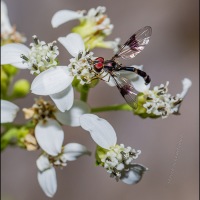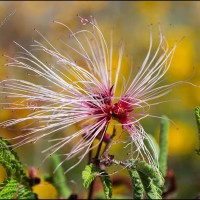Mustang grape gall
When it comes to native grapevines, central Texas claims the mustang grape (Vitis mustangensis) as its most common. To the best of my recollection, not till July 12th of this year, while walking along Bull Creek, did I ever find a gall on a mustang grape. Below is a view from the side.
UPDATE: Thanks to a link from Steve Gingold, I can add that the gall midge Ampelomyia vitispomum seems to have instigated this growth on the mustang grape vine.
§
§ § §
§
While still teaching in the Austin public schools back in the late 1970s I became aware of Marva Collins, a black schoolteacher in Chicago who likewise became disenchanted with public education. She founded her own school and succeeded in educating poor black kids by holding them to high expectations and standards, not putting up with excuses, and loving her students.
I hadn’t thought about Marva Collins for a long time but for some reason she came to mind the other day and I looked to see if she’s still alive. She’s not, having died in 2015.
An article by Carrie-Ann Biondi in the Spring 2019 issue of The Objective Standard includes the following:
After graduating in 1957 from Clark College in Atlanta, Georgia with a degree in secretarial science, Collins sought a job as a secretary. She explained, though, that “none of the private companies wanted to hire a black secretary.” So she took one of the few jobs open to an educated black woman in the 1950s American South: She became a teacher. Collins found that she enjoyed teaching secretarial skills at Monroe County Training School. There, she learned how to teach through trial and error, recalling what best helped her to learn, avoiding the mistakes some of her own teachers made, and taking seriously the feedback she got from the school’s principal. Even so, after two years at that job, she moved to Chicago, holding that it would help her develop independence from her father.
In Chicago, Collins first worked as a medical secretary. She soon fell in love, got married, and, in time, had three children. Finding that she “missed the classroom . . . the excitement of helping students discover the solution to a problem,” Collins applied for a teaching position in the Chicago public school system. Although she had no teaching certificate, because of a teacher shortage she was hired to teach second grade.
Collins’s lack of a teaching degree worked to her advantage—and to that of her students. She trusted her own experience and disregarded the Board of Education’s teaching guide, which prescribed the “look-say” method to teach reading, simplistic Dick-and-Jane books with lots of pictures, and dull workbooks that drilled “skills” without teaching students how to think for themselves. Ignoring all of this, Collins developed teaching methods that truly worked. She used phonics to teach reading, incorporated literary classics and poetry into the curriculum, facilitated in-depth discussions of the readings, had students memorize poetry and write papers for oral delivery, and used positive (rather than punitive) discipline to address misbehavior.
After 14 years in the Chicago public schools, Marva Collins felt so at-odds with what the district as a whole was doing that she resigned and eventually started her own school.
Observers in Collins’s classroom repeatedly were astonished by the high-level curriculum she developed for students ages three to thirteen. She began each year with essays such as Ralph Waldo Emerson’s “Self-Reliance” and fables such as “The Little Red Hen.” Students soon moved on to poetry, including works by Rudyard Kipling and [Henry] Wadsworth Longfellow. In time, they progressed to Plato’s dialogues. By second and third grade, they were reading William Shakespeare’s plays (Macbeth and Hamlet were student favorites) and reciting Chaucer’s Canterbury Tales. With these under their belts, it was not uncommon for students to dive headlong into a seemingly unquenchable reading frenzy. And Collins kept hundreds of books on hand, suggesting just the right one for each student to read next. Each student wrote a report every two weeks about his latest book, presented it to the class, and answered questions raised by the other students. This sparked so much interest in reading that book that students vied to be next on the waiting list.
Marva Collins went to the greatest works that English-language literature had to offer. What a contrast from today’s racial essentialist imperative to jettison anything by “dead white guys.”
In 1981 Cicely Tyson played the title character in the made-for-television movie “The Marva Collins Story,” with Morgan Freeman playing her supportive husband. I was surprised to find the full 112-minute film available to watch for free on YouTube. Check it out the next time you have two hours for an inspiring movie.
© 2022 Steven Schwartzman












Marva Collins had real answers to the problems with modern education. Thanks for the movie link. 🙂
AT SUNNYSIDE - WHERE TRUTH AND BEAUTY MEET
August 7, 2022 at 5:25 AM
You’re welcome. If I ever knew about the existence of that movie, I’d forgotten about it until the other day. Better late than never.
As much as I like Marva Collins’s approach to teaching, I wonder to what extent it’s “scalable.” By that modern adjective I mean that, given the bell curve of people engaged in any profession, are there enough teachers capable of following her model even if school districts allowed them to? I’ve read that in Finland only academically strong students are allowed to even enter programs to become teachers. In the United States, unfortunately, the situation is reversed: college students who go into education have on average among the lowest standardized test scores of all majors.
Steve Schwartzman
August 7, 2022 at 7:00 AM
Finding solutions does feel overwhelming. A million Marva Collins-like reformers would help, but I fear she was a rare gem.
AT SUNNYSIDE - WHERE TRUTH AND BEAUTY MEET
August 7, 2022 at 12:40 PM
It usually feels overwhelming to me, too, given the zealous intransigence of the opposition. Maybe geneticists will find a way to clone Marva Collins.
Steve Schwartzman
August 7, 2022 at 12:49 PM
Marva Collins must have set many people up for a good future.
Ann Mackay
August 7, 2022 at 7:17 AM
You raise a good question: I wonder if anyone has followed up to see what her former students went on to do.
Steve Schwartzman
August 7, 2022 at 7:19 AM
I remember reading about Marva Collins many years ago. There just aren’t many today with her sense of what it takes to succeed. I don’t always agree with your posts but in this case I do. Today’s politics regarding education are ridiculous. The same people who rail against banning books that may make someone uncomfortable want to ban old literature because it may contain uncomfortable writing.
Your gall is a midge gall, Here’s a list of which ones can be found in Texas with a couple in Austin.
Steve Gingold
August 7, 2022 at 7:32 AM
Thanks for your link, which led me to https://bugguide.net/node/view/1087156. That looks like what I photographed, so Ampelomyia vitispomum seems to be the midge involved.
Marva Collins provided a great model for teachers. If only there were more like her. Alas, the educational establishment militates against that even more now than when Marva Collins felt compelled to leave the establishment and go her own way half a century ago.
The 80% of people in the middle — and that’s a big middle — may be able to agree on more things than we think they can.
Steve Schwartzman
August 7, 2022 at 8:07 AM
Unfortunately they are not the loudest and loud gets the media’s attention.
Steve Gingold
August 7, 2022 at 11:00 AM
I’ve been wishing for a long time that we could get a media outlet that reports the news without spinning it.
Steve Schwartzman
August 7, 2022 at 12:37 PM
You’d need Murdochian money.
Steve Gingold
August 7, 2022 at 1:03 PM
Maybe Murdoch and Soros could donate equal amounts.
Steve Schwartzman
August 7, 2022 at 1:09 PM
Wouldn’t their cooperative collaboration be a breath of fresh air….maybe?
Steve Gingold
August 7, 2022 at 1:10 PM
Hey, I’m all for it!
Steve Schwartzman
August 7, 2022 at 1:19 PM
we have a wide variety of Cynipid Wasp galls here starting to show…
Alessandra Chaves
August 7, 2022 at 9:44 AM
I had to look that up. The article about those wasps in Texas shows a picture of a kind of gall I’ve often seen here:
https://texasinsects.tamu.edu/cynipid-wasp/
Steve Schwartzman
August 7, 2022 at 12:39 PM
As you know, English is not my mother tongue. So I had to look up gall in the dictionary. I was quite pleased when I learned that you were not talking about impudent behaviour but presented a photo of an outgrowth. Learning never ends.
Peter Klopp
August 7, 2022 at 9:54 AM
I may sometimes be guilty of impudent behavior, but yes, this a different kind of gall. A German word for it seems to be Gallapfel:
https://de.wiktionary.org/wiki/Gallapfel
Steve Schwartzman
August 7, 2022 at 12:45 PM
I know so little about galls this post sent me exploring, and now I think that many galls I’ve seen have been goldenrod galls. I often see the gall, but can’t identify the plant that’s hosting it because the season’s so far spent the plant’s little more than a naked stalk. The next time I see one, I’ll take the time to pay more attention. I didn’t realize that myriad tiny galls can cover leaves, too, making their surface bumpy. I don’t know what I thought those oddities were, but I never considered galls.
shoreacres
August 7, 2022 at 6:32 PM
Oh, the gall of those insects, creating lumps and bumps the way they do on poor innocent plants and trees. Your mention of goldenrod galls sent me looking at pictures on the Internet, which make be think I’ve seen and perhaps photographed them, even if I never posted pictures of any. With goldenrod season coming up in a couple of months, we’ll both have chances to see some.
Steve Schwartzman
August 7, 2022 at 6:48 PM
Marva Collins was obviously a marvellous teacher. She probably wouldn’t have been impressed by my reading skills today. I read the title of your post as Mustang Grape Gal and immediately wondered if this gal had some kind of connection to that other Mustang Gal, the one named Sally. My wondering stopped as soon as I realized that the Gal was actually Gall. In a way, though, the Gall is ‘riding’ the Mustang Grape. Yes? No? (I think Miss Marva is about to send me off to write a paper on the difference between gals and galls.)
Gallivanta
August 8, 2022 at 2:46 AM
If you do write a paper about the difference between gals and galls I hope you’ll publish it. Perhaps you can work Mustang Sally into it as well, who could be riding on a huge gall. And maybe even the marvelous Marva will make an appearance. What a phantasmagoria it could be. My mind also now and then “repurposes” a word when I’m reading. At times it creates interesting combinations, like your Mustang Grape Gal.
Steve Schwartzman
August 8, 2022 at 6:26 AM
A phantasmagoria indeed.
Gallivanta
August 9, 2022 at 4:05 AM
Huh … just learned something new. And then there are gallstones too.
denisebushphoto
August 8, 2022 at 11:37 AM
The gall in gallstone is a different word from the kind of gall on plants. Appearances can be deceptive.
Steve Schwartzman
August 8, 2022 at 12:23 PM
Seems related!
denisebushphoto
August 8, 2022 at 12:33 PM
Yes, there are plenty of words that coincidentally end up looking similar or identical, and sometimes they end up influencing each other’s meanings. For example, the phrase “to home in on” now frequently gets recast as “to hone in on.” If you want to sort out the different types of gall, have a look at
https://www.etymonline.com/word/gall
Steve Schwartzman
August 8, 2022 at 12:41 PM
I had no idea that there were at least 1,500 gall-producing insects. And I was never truly aware of the existence of several native North American grape vines, even though a fellow blogger recently commented on the fact that Concord grapes originated in Massachusetts.
Marva Collins sounds like a remarkable woman and inspired teacher. How fortunate for her pupils that she found her calling, despite many obstacles.
tanjabrittonwriter
August 8, 2022 at 10:25 PM
I didn’t know there were that many gall-producing insects, either. I wonder how the process of gall creation originated. I also didn’t know that Concord grapes were named for the Concord in Massachusetts. You’ve reminded me of the wine I was familiar with in childhood:
https://www.heb.com/product-detail/manischewitz-concord-grape-wine/217022
I’m sorry I never met Marva Collins.
Steve Schwartzman
August 9, 2022 at 6:20 AM
Manischewitz was also mentioned in one of the articles about native grape vines. I don’t think I have ever drunk any.
tanjabrittonwriter
August 9, 2022 at 9:28 AM
It’s very sweet. Some people don’t like that, while I do. It matches my sweet disposition.
Steve Schwartzman
August 9, 2022 at 12:35 PM
😊
tanjabrittonwriter
August 9, 2022 at 10:05 PM
I love your Marva Collins story. Think I left teaching English and Drama when it became so prescriptive around 2013 in UK and creative responses not important. We were told only English Literature too and so the well stocked and exam text ‘of Mice and Men’ almost hit the dust until I think our very knowledgable minister for education saw the costs involved! We had even had to buy clean texts for the exam only no book testing. And poor old Shakespeare was demoted to analysis of language rather than responses that 15 year olds could relate too. Thanks Marva for teaching as it should be done!
navasolanature
August 9, 2022 at 10:13 AM
I don’t know much about education in Britain, but from what you’re saying and from things I’ve heard and read, Britain has unfortunately gone down some of the same straying paths in education that the United States has. I’m sorry to hear it.
Steve Schwartzman
August 9, 2022 at 12:43 PM
[…] year I wrote a commentary about Marva Collins, an elementary school teacher in the poor Garfield Park neighborhood of […]
A fifth installment of icicles | Portraits of Wildflowers
January 19, 2023 at 4:34 AM
[…] Last year and yesterday I mentioned Marva Collins, who for decades worked wonders of education with black children in a poor Chicago neighborhood. I’ve found some online videos about her and her school that you can watch: […]
An early-in-the-season yet late-in-the-year drive along the Possumhaw Trail | Portraits of Wildflowers
January 20, 2023 at 4:27 AM